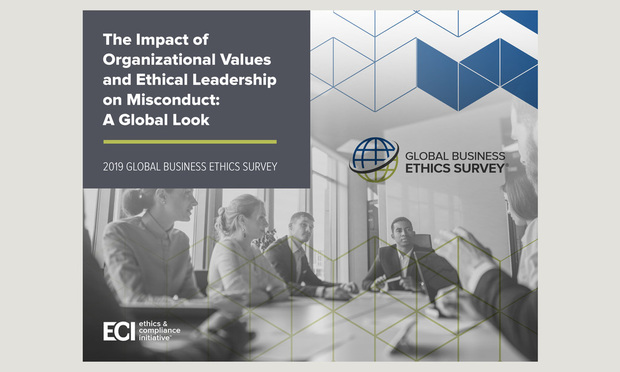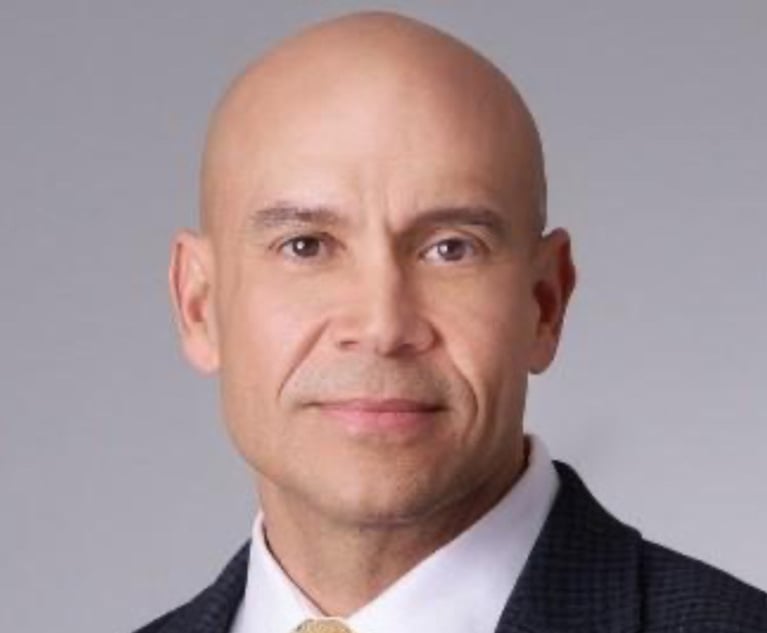More Investment in Stressing Core Values, Ethics Can Mean Less Misconduct
More corporate investment in strengthening core values and ethical leadership can help reduce misconduct in the entire organization, according to a new business ethics report.
November 07, 2019 at 04:49 PM
4 minute read
 Global Business Ethics Report
Global Business Ethics Report
More corporate investment in strengthening core values and ethical leadership can help reduce misconduct in the entire organization, according to a new business ethics report.
The 2019 Global Business Ethics Survey report released last week by the Ethics & Compliance Initiative also found that employees who work in organizations with a strong commitment to values and ethical leadership are less likely to feel pressure to compromise standards and are more likely to want to remain at their organization.
The Ethics & Compliance Initiative, based in Vienna, Virginia, is a nonprofit group that provides research and a best practice community to its members and their general counsel, as well as certification opportunities for ethics and compliance professionals.
CEO Pat Harned said the summary, "The Impact of Organizational Values and Ethical Leadership on Misconduct: A Global Look," is one of four reports based on the group's annual survey. This year's survey collected data from 18,000 employees based in 18 countries and asked about observed misconduct and the reporting of misconduct.
"We've been looking at organizational cultures for a very long time," said Harned, who has led the group for two decades. "This year we focused the survey on how employees perceive the culture in their own organization."
Harned said the data were consistent with past findings. On median scores, globally 39% of employees did not see a strong commitment to values in their organization, and 58% did not see a strong commitment to ethical leadership.
Broken into regions, the data show that Europe scored the worst on the commitment to values, with 48% saying their organizations were lacking. Africa and the Middle East had the best score at 33%.
More employees in the Asia Pacific region saw a lack of ethical leadership, at 67%, while only 47% in North America shared that perception.
The survey asked employees about observing three common types of company misconduct in the past 12 months: abusive behavior by managers, violations of health and safety regulations, and conflicts of interest. It then correlated their answers to that question with their perceptions of commitment levels.
About 60% of the employees were supervisors or above while 40% were non-management.
Not surprisingly, Harned said, employees who reported the weakest commitments to values and ethics also reported the highest observance of misconduct in their companies.
"When employees feel that their leaders are committed to the values of the organization then there is a significant difference in how often employees see wrongdoing," she explained.
She pointed out the report contains several tips for strengthening values and ethical leadership. They include:
- Leaders need to assume the role of ethical champions, talking about the importance of ethical conduct, referencing values as a framework for decisions and encouraging employees to speak up about issues.
- Leaders should act in accordance to organizational values and also need to be held accountable for their performance in relation to ethics and compliance.
- Employees' performance evaluations should include how their actions align with organizational values.
One corporate sponsor of this year's study was Walmart Inc., where CEO Doug McMillon exhibits traits cited in the report by openly talking about the company's values and unique culture.
In an introduction to the company's statement of ethics, McMillon wrote that it is "a daily resource for making honest, fair and objective decisions while operating in compliance with all laws and our policies … Through your ethical behavior and willingness to speak up for the highest standards, we earn and keep the trust of our customers, each other and our local communities."
This content has been archived. It is available through our partners, LexisNexis® and Bloomberg Law.
To view this content, please continue to their sites.
Not a Lexis Subscriber?
Subscribe Now
Not a Bloomberg Law Subscriber?
Subscribe Now
NOT FOR REPRINT
© 2025 ALM Global, LLC, All Rights Reserved. Request academic re-use from www.copyright.com. All other uses, submit a request to [email protected]. For more information visit Asset & Logo Licensing.
You Might Like
View All
The Met Hires GC of Elite University as Next Legal Chief

'Everything From A to Z': University GCs Tested by Legal, Financial, Societal Challenges
6 minute read
Ex-Cancer Society CLO Takes Legal Reins of Habitat for Humanity International
3 minute read
$17B Episcopal Church Pension Fund Hires New Legal Chief as Staff Changes Continue
Trending Stories
Who Got The Work
J. Brugh Lower of Gibbons has entered an appearance for industrial equipment supplier Devco Corporation in a pending trademark infringement lawsuit. The suit, accusing the defendant of selling knock-off Graco products, was filed Dec. 18 in New Jersey District Court by Rivkin Radler on behalf of Graco Inc. and Graco Minnesota. The case, assigned to U.S. District Judge Zahid N. Quraishi, is 3:24-cv-11294, Graco Inc. et al v. Devco Corporation.
Who Got The Work
Rebecca Maller-Stein and Kent A. Yalowitz of Arnold & Porter Kaye Scholer have entered their appearances for Hanaco Venture Capital and its executives, Lior Prosor and David Frankel, in a pending securities lawsuit. The action, filed on Dec. 24 in New York Southern District Court by Zell, Aron & Co. on behalf of Goldeneye Advisors, accuses the defendants of negligently and fraudulently managing the plaintiff's $1 million investment. The case, assigned to U.S. District Judge Vernon S. Broderick, is 1:24-cv-09918, Goldeneye Advisors, LLC v. Hanaco Venture Capital, Ltd. et al.
Who Got The Work
Attorneys from A&O Shearman has stepped in as defense counsel for Toronto-Dominion Bank and other defendants in a pending securities class action. The suit, filed Dec. 11 in New York Southern District Court by Bleichmar Fonti & Auld, accuses the defendants of concealing the bank's 'pervasive' deficiencies in regards to its compliance with the Bank Secrecy Act and the quality of its anti-money laundering controls. The case, assigned to U.S. District Judge Arun Subramanian, is 1:24-cv-09445, Gonzalez v. The Toronto-Dominion Bank et al.
Who Got The Work
Crown Castle International, a Pennsylvania company providing shared communications infrastructure, has turned to Luke D. Wolf of Gordon Rees Scully Mansukhani to fend off a pending breach-of-contract lawsuit. The court action, filed Nov. 25 in Michigan Eastern District Court by Hooper Hathaway PC on behalf of The Town Residences LLC, accuses Crown Castle of failing to transfer approximately $30,000 in utility payments from T-Mobile in breach of a roof-top lease and assignment agreement. The case, assigned to U.S. District Judge Susan K. Declercq, is 2:24-cv-13131, The Town Residences LLC v. T-Mobile US, Inc. et al.
Who Got The Work
Wilfred P. Coronato and Daniel M. Schwartz of McCarter & English have stepped in as defense counsel to Electrolux Home Products Inc. in a pending product liability lawsuit. The court action, filed Nov. 26 in New York Eastern District Court by Poulos Lopiccolo PC and Nagel Rice LLP on behalf of David Stern, alleges that the defendant's refrigerators’ drawers and shelving repeatedly break and fall apart within months after purchase. The case, assigned to U.S. District Judge Joan M. Azrack, is 2:24-cv-08204, Stern v. Electrolux Home Products, Inc.
Featured Firms
Law Offices of Gary Martin Hays & Associates, P.C.
(470) 294-1674
Law Offices of Mark E. Salomone
(857) 444-6468
Smith & Hassler
(713) 739-1250






